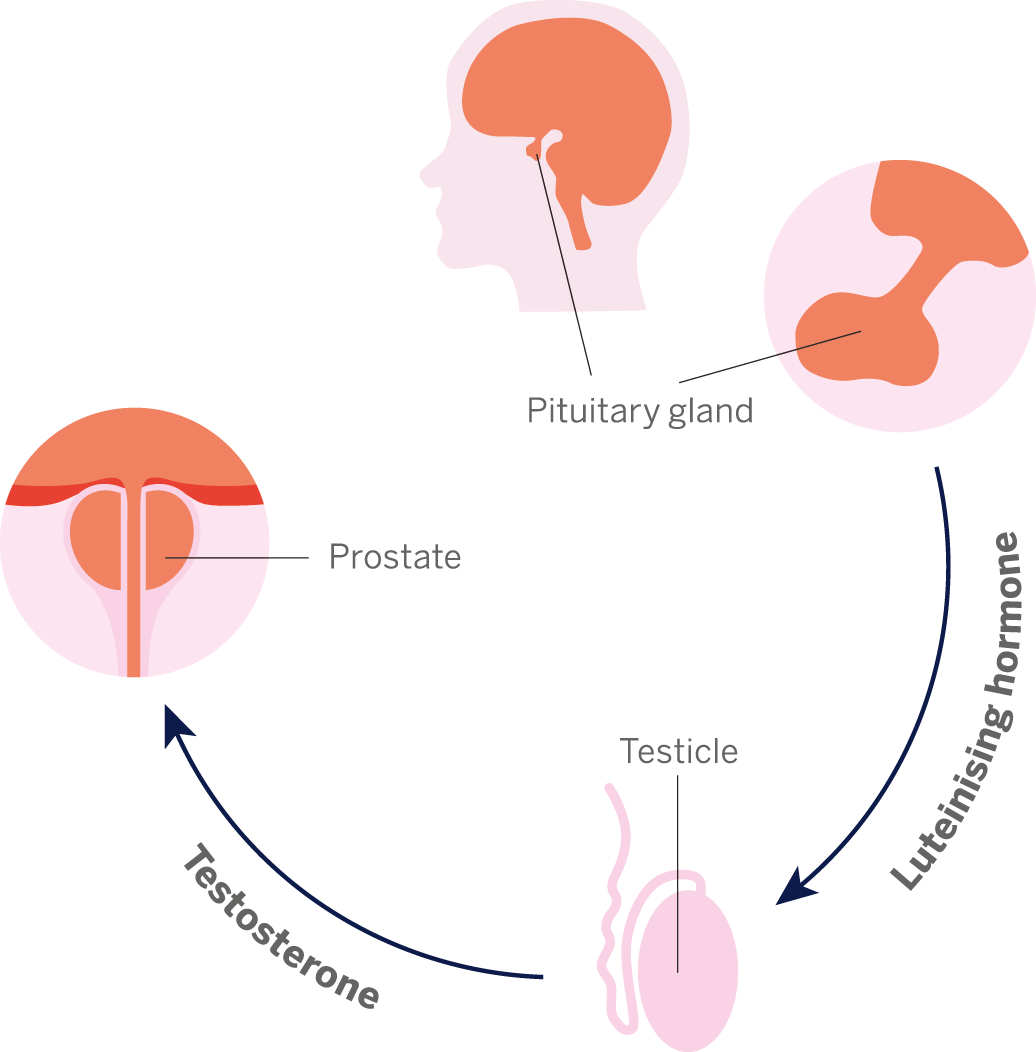
Saturday: 10 am - 1 pm
Prostate Cancer
Prostate cancer is a serious condition which affects the prostate, a small gland in men responsible for producing seminal fluid. It is one of the most common types of cancer in men, especially as they age, so regular screenings play a vital role in its early detection.
Early detection and treatment are crucial to managing the disease and ensuring the best possible outcomes. Identifying cancer in its early stages significantly increases the chances of successful treatment.
At Precision Prostate Clinic, our team of experts is committed to providing comprehensive care for men with prostate cancer, using the most advanced technology and treatment methods.

Causes and Risk Factors
Prostate cancer is primarily influenced by a combination of genetic, environmental and lifestyle-related factors. Although the exact cause is not fully understood, several risk factors have been identified
Prostate Cancer Symptoms
In its early stages, prostate cancer may not cause noticeable symptoms, which makes regular checkups essential. However, as the disease progresses, symptoms may include:

Why Choose
Precision Prostate Clinic?
We Check All The Boxes
Expertise and Experience:
We are one of the world leaders in using and training other doctors in Holmium Laser Prostatic Enucleation (HoLEP) for the treatment of prostate conditions. Our team is composed of highly skilled specialists in urology, oncology, and radiotherapy.
Comprehensive Care:
Our multidisciplinary team collaborates to provide a full spectrum of prostate cancer treatments, from minimally invasive procedures to advanced surgical techniques.
Patient-Centered Approach:
We prioritize patient comfort, safety, and affordability. We understand that prostate cancer can cause significant discomfort, such as difficulty urinating, frequent nighttime urination, and painful urination. Our goal is to provide relief as quickly and comfortably as possible.

Prostate Diagnostic Services

Uroflowmetry
This non-invasive test measures the rate of urine flow, helping to evaluate urinary tract function and identify obstructions or abnormalities.
Prostate Ultrasound
It uses high-frequency sound waves to create detailed images of the prostate gland without exposing the patient to radiation. This painless procedure helps detect abnormalities, evaluate prostate size and guide biopsies when needed, providing crucial information for an accurate diagnosis.
Transperineal Prostate Biopsies
As a pioneering service in Mexico, transperineal prostate biopsies offer a safer and more accurate method for obtaining prostate tissue samples. This technique reduces the risk of infection and provides more accurate results, helping in the early detection of prostate cancer.
Urodynamics
Urodynamic tests evaluate bladder function and pressure. This comprehensive evaluation helps identify underlying causes and guides the development of personalized treatment plans.
Cystoscopy
Cystoscopy involves inserting a thin, flexible tube with a camera into the urethra to examine the bladder and urethra. This procedure helps diagnose urinary tract conditions, such as obstructions or tumors, and evaluate the effectiveness of previous treatments.
How We Treat Prostate Cancer
Super Extended Lymphadenectomy
This procedure involves extensive removal of the lymph nodes to ensure complete removal of cancer cells, especially in cases of locally advanced prostate cancer.
Our experienced surgical team performs this complex procedure to reduce the risk of cancer recurrence and provide a comprehensive approach to treatment.

Tumor Removal - Local Recurrence of Prostate Cancer
For patients who experience a recurrence of prostate cancer, targeted removal of tumors can be crucial. This procedure focuses on remove cancerous tissue while preserving as much healthy tissue as possible.
Precision Prostate Clinic's multidisciplinary team collaborates to develop personalized strategies and effectively manage recurrences.

Robot-Assisted Radical Prostatectomy
This minimally invasive surgery uses advanced robotic technology to precisely remove the prostate gland. It offers several benefits, such as less pain, minimal blood loss, and faster recovery times. At Precision Prostate Clinic, our expert surgeons use this technology to ensure optimal results while preserving nerve function, which can help maintain urinary and sexual function after surgery.
.png)
Cryotherapy and Irreversible Electroporation
These innovative focal therapies are designed to target specific cancerous areas within the prostate. Cryotherapy uses extreme cold to destroy cancer cells, while irreversible electroporation uses electrical pulses to permeabilize cell membranes. Both options are less invasive and aim to minimize side effects while effectively controlling localized cancer.

Intensity-Modulated Radiation Therapy (IMRT)
IMRT is an advanced form of external radiation therapy that precisely targets prostate cancer cells while protecting surrounding healthy tissue. This technique allows for higher doses of radiation with fewer side effects, improving treatment effectiveness and patient comfort.
The radiation oncologists at Precision Prostate Clinic use the latest IMRT technology to provide accurate and effective care.
.jpeg)
Hormonal Therapy - Immunotherapy
Hormone therapy seeks to reduce or block the production of hormones such as testosterone, which fuel the growth of prostate cancer. This treatment can slow the progression of cancer and is often used in combination with other therapies.
Immunotherapy harnesses the body's immune system to attack and destroy cancer cells, offering a personalized approach to fighting prostate cancer.


Why Choose Guadalajara, Mexico for Your Surgery?
Choosing Guadalajara for your surgery means access to world-class medical expertise and state-of-the-art facilities at a fraction of the cost you'd pay elsewhere. The city is known for its exceptional health services and highly qualified specialists.




Frequently Asked Questions about Prostate Cancer
Can Prostate Cancer Be Cured?

Yes, prostate cancer can be cured in many cases, especially if detected early. The success of treatment depends on several factors, such as the stage of the cancer, the patient's general health, and the type of treatment chosen. Options such as surgery, radiation therapy, and hormone therapy can be very effective in killing cancer or controlling its spread. Regular screenings and early detection are key to improving the chances of a successful outcome. It is essential to discuss treatment options with a healthcare professional to determine the most appropriate approach for each case.
At What Age Is Prostate Cancer Most Aggressive?
Prostate cancer tends to be more aggressive in men younger than 55. Although it is less common for young men to develop this cancer, when it does occur, it often progresses more rapidly compared to cases diagnosed in older men. The aggressiveness of cancer can also vary depending on individual factors such as genetics and general health. Regular screenings and early detection are essential, especially for those with a family history of the disease or other risk factors. If you have concerns about your risk, it's important to discuss it with your doctor.
Can I Live a Normal Life with Prostate Cancer?
Yes, many men can live normal lives with prostate cancer, especially if it is detected early and is effectively managed. This type of cancer often grows slowly, and many men live for years without experiencing significant symptoms or complications. Even in cases where treatment is necessary, modern therapies can effectively manage cancer, allowing patients to maintain a good quality of life. Regular monitoring, lifestyle adjustments, and open communication with your doctor can help you live a normal life while dealing with prostate cancer.
What Causes Prostate Cancer?
The exact causes of prostate cancer aren't fully understood, but several factors can significantly increase the risk. Age is a major factor, as the likelihood of developing prostate cancer increases dramatically after age 50, and most cases occur in men over 65. A family history of prostate cancer, especially in close family members such as a father or brother, also increases the risk, pointing to a genetic link. In addition, race and ethnicity play a role, as prostate cancer is more common and aggressive in African-American men and less prevalent in Asian and Hispanic men. Lifestyle and diet choices, such as diets rich in red meat and high-fat dairy products, along with a low intake of fruits and vegetables, have been associated with increased risk, as have obesity and a sedentary lifestyle. Hormonal factors, in particular higher levels of testosterone, can also contribute to the development of prostate cancer. Understanding these risk factors can help guide decisions about prevention strategies and medical tests.
What is the Life Expectancy with Prostate Cancer?

Life expectancy with prostate cancer varies depending on factors such as the stage of diagnosis, the aggressiveness of the cancer, and the patient's general health. Many men with early-stage prostate cancer have a high survival rate, with nearly 100% living five years or more after diagnosis. Even in more advanced cases, modern treatments can significantly extend life expectancy. It's important to consult with your doctor to understand your specific prognosis and to explore treatment options that can help you manage your condition effectively.
Can a Man Live Without a Prostate?
Yes, a man can live without a prostate. It is often surgically removed in a procedure called prostatectomy, which is usually done as a treatment for prostate cancer. Although life without a prostate is possible, it can come with some changes and side effects, such as urinary incontinence and erectile dysfunction. These effects can vary in severity and, in many cases, improve over time through treatment and rehabilitation. Many men lead full and active lives after prostate removal, especially with appropriate medical care and lifestyle adjustments. It's important to discuss possible outcomes and management strategies with your doctor.
Does Prostate Cancer Spread Fast?
Prostate cancer usually grows and spreads slowly, especially in its early stages. However, some types can be more aggressive and spread quickly. The speed of spread depends on several factors, such as the grade and stage of the cancer, as well as the patient's general health. Regular screenings and early detection are crucial to identify the type and progression of prostate cancer, allowing for the initiation of timely and appropriate treatment. If you have concerns about the aggressiveness of prostate cancer, it's important to talk to your doctor.
Is It Better to Remove the Prostate or Get Radiation Therapy?
The decision between prostate removal (prostatectomy) and radiation therapy depends on several factors, including the stage and severity of the cancer, the patient's age, general health and personal preferences. Prostatectomy, or surgical removal of the prostate, is usually recommended for men with localized cancer who are in good health and can tolerate surgery.
This approach can effectively eliminate cancer and provides a clear pathological report, although it has potential side effects such as urinary incontinence and erectile dysfunction.
On the other hand, radiation therapy is less invasive and may be a good option for men who are not ideal candidates for surgery due to other health conditions. It's also effective in treating localized prostate cancer and has its own set of side effects, such as intestinal problems, fatigue, and a lower risk of urinary problems compared to surgery.
Ultimately, the choice between surgery and radiation therapy should be made after a thorough discussion with your doctor, considering your specific situation and the risks and benefits of each option. Both treatments can be effective, and the decision often comes down to personal preferences and individual health factors.


.svg)